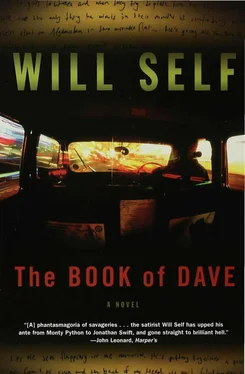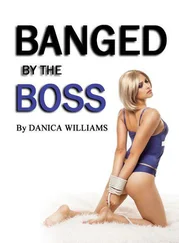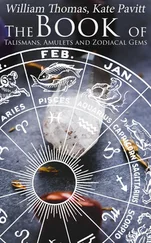
To call them cells would have been wrong — they were stalls rather, crudely partitioned with heavy wood beams. Wealthier prisoners, or those who had special influence, were able to secure one of the tiny chambers on the upper gallery, but for those such as him there was only the nightly squabble to get into one of the stalls, then burrow into the stinking straw to find some warmth. Squabbling went on all the time and there were also full-scale fights. The other prisoners had blades and coshes, they spat, kicked and gouged. Symun had never experienced any real violence: the cuffs of the Ham daddies were as mere caresses compared to the savage blows traded here as a matter of course. The first time Symun was attacked, he was so shocked that he relapsed into a vacant stupor, staring at the livid pink impress the kick had left on his leg. Without the coaxing of the prisoner who became his mate, he would have expired then and there, because to survive in this place a dad had to fight.
The Tower was a world in its own right, with its own economy and politics, law and religion. For Symun, this was the only realm he'd ever seen outside of his island home. He was chained in the ferry's hold for the voyage from Wyc. On the rare occasions the gaffer allowed him to exercise on deck he saw distant estates and manors along the coast. When they docked at London, he was taken off and driven through the streets in a sweatbox. If he peered between the irony shutters, he caught glimpses of vast buildings, yet he was unable to comprehend what it was that he was seeing — nothing tallied with the descriptions he had heard, and the tumult was such — of cars, people and beasts — that he recoiled in fear and confusion.
In the Tower, under the tutelage of Terri, a convicted cockney thief, Symun Dévúsh slowly came back to life. The trauma of his birth into this frightening world, where he shared a huge yard with ten times as many men as he'd ever seen before, was followed by a period of infancy. Symun asked questions; Terri supplied the answers. The yard was but one of three in the gaol. There was a smaller one for mummies and a third for alien chaps, who had been taken prisoner in the continuous skirmishing between the King's army and the wild tribes of Jocks and Taffies to the north and the west of the archipelago.
In the dads' yard all the prisoners — regardless of their offence, their sentence, or even if they had been tried or merely remanded — were thrown together: flyers, traitors and murderers alongside petty thieves, debtors and vagabonds. Terri thought there might be as many as a thousand fares confined in the Tower, and each day their numbers were swelled by Londoners, who came from without the walls to ply their trades and even barter for the use of skilled prisoners in their own workshops. Thus there was much commerce in the Tower, which was furnished with its own shops, a bakery, even the services of a notary. For a price a dad might wed in the gaol and lie with his wife. He could engage in his own trade and reap the reward. If imprisoned for debt, he could even fall into debt again, and so be confined in the Tower's own debtors' gaol, a prison within a prison. He could drink and whore, cock fight and game. During the tariffs of foglight the yard was a frenetic arena, and on its beaten earth dads in all manner of strange costumes — suits, striped and checked, jeans tight and flared, tattered cloakyfings and formal robes — strutted and preened like caged birds.
Once he began properly to observe his fellow prisoners Symun was amazed to discover how little religion there was among them. His automatic requests for directions from Dave were met with derision and laughter. One dad, in full view of the warders, squatted down and broke wind, proclaiming: Eye fart on yor polstrë, O Dryva! They took no action against him, but then this dad was not held on a charge of flying. The warders, Symun soon learned, interfered little in the lives of the prisoners, except to take bribes for services given and dole out privileges for those rendered. The prisoners themselves ran the gaol while their gaolers merely looked on — only in the matter of flying were they truly vigilant. The flyers — who numbered a few score — were distinguished by the large, two-spoked wooden wheel they were obliged, on pain of beating, to carry about their necks. Symun Dévúsh had never seen a real wheel before coming to London — to him it was a sacred symbol. Now one hung around his neck, galling him no matter how carefully he moved.
The warders made sure that the flyers were overheard when they spoke, either by themselves or their seeseeteevee men. Should they utter any further word against the writ of the PCO, or the Dävinanity it promulgated, they were summarily punished. The big steering Wheel was brought out into the yard and set upon its column. The flyer was trapped and lashed to its spokes. Then the Wheel was spun and spun, until the unfortunate dad was bleeding from his nose and mouth, and his innards were mangled. Within a blob of arriving at the Tower Symun had seen two flyers die upon the Wheel. Then his own appearances began.
The flyers' appearances took the form of questioning their Knowledge. No flyer could secure his release from gaol by passing his appearances — for once accused of flying you were banished from the cab for ever. However, by calling over the runs and points demanded, he might at least secure a remission. He wouldn't have another appearance for fifty-six more days, during which time he could struggle to improve his Knowledge. If a flyer failed an appearance the consequences were harsh — their next would be in twenty-eight days. A second failure and this was reduced to twenty-one, a third to fourteen. After a fourth failure the flyer went for judgement before the PCO itself, then sentence would be carried out.
The least severe punishment was branding and exile, followed by the cutting out of the tongue and exile. The most severe penalty — which was frequently applied — was death. Dads were wheeled until their brain haemorrhaged, then they were disembowelled. Then, as the poor unfortunate was mindlessly gawping at his guts lying on the ground at his feet, his genitals were cut off and thrust in his mouth. Death came within units. The dead dad's head was then severed and stuck on a spike at the water gate; beneath it a placard was hung that read: VIS MANNE SPEEKS BOLLOX. Mummies — who were not deemed worthy of the Wheel even in death — were burned on the barbie. If they were guilty of evading Changeover, their moribund exhalations were employed in gassing their own children.
All the daddies' executions were held publicly in Leicester Square; the mummies' at Marble Arch. A large enthusiastic crowd would gather to watch and keenly observe the comportment of the condemned; they would lay bets on how long each would take to expire. A common criminal might sway the crowd with his brave demeanour, and the Inspectors would grant him pardon at the foot of the Wheel, but however well a flyer behaved he was doomed.
This much Symun was soon made aware of — yet there was little he could do to prepare himself for his ordeal. He'd had scant opportunity to read the Book since acquiring his phonics. While, like all Hamstermen, he'd been accustomed since boyhood to call over the runs and points, this oral recounting was haphazard and imprecise. In the broad Mokni of Ham the runs were strings of meaningless gibberish — and while Symun knew enough to differentiate one from the other in his own mind, he was by no means certain that he could convince a prejudicial examiner that his was the correct version. It was the same for any cockney or hick — with the consequence that while well-born flyers often survived in the Tower for years, the illiterate were dispatched with great expeditiousness.
Читать дальше













